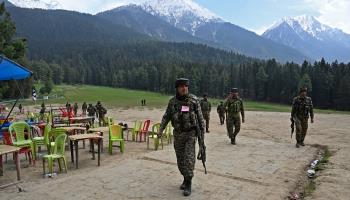Bilateral tensions are soaring following a militant attack in Indian-administered Kashmir
India-Pakistan tensions are soaring following a major militant attack in Indian-administered Kashmir last week; Delhi and Islamabad administer different parts of Kashmir and dispute sovereignty over the region. India responded to the incident by announcing several measures aimed at reducing diplomatic contacts and cross-border travel, to which Pakistan responded with similar counter-measures. Delhi also suspended the Indus Waters Treaty (IWT), which Islamabad then said could not be unilaterally suspended.
What’s next
Subsidiary Impacts
- Highly nationalistic media in the two countries will remain a key factor in fanning tensions.
- India will step up its Kashmir counterterrorism campaign.
- Tourism in Indian-administered Kashmir will suffer because of the fallout from the attack.
Analysis
India claims all of Kashmir. Pakistan claims all of the region except areas it ceded to China (see INDIA/PAKISTAN: Tensions will rise in Kashmir – August 18, 2021).

The April 22 attack near Pahalgam, in the Kashmir division of the Jammu and Kashmir union territory, killed 26 people, mostly Indian tourists. Some eyewitness accounts suggest that the perpetrators singled out Hindu men, killing them when they failed to recite certain Islamic verses.
An insurgency has raged in Indian-administered Kashmir for decades, but the incident was among the largest attacks in recent years.
The Resistance Front (TRF), which Indian officials consider an offshoot of Pakistan-based Lashkar-e-Taiba, appeared to claim responsibility, expressing discontent at “outsiders” settling in the region and causing “demographic change”. However, it later seemingly distanced itself from the incident, saying the claim was false and the result of a breach by Indian cyber intelligence.
TRF was formed in response to Delhi’s 2019 move to revoke the special status of the part of Kashmir it runs and divide the erstwhile state into two federally administered union territories. The statement denying the original claim said attributing the attack to TRF was designed to “malign the Kashmiri resistance”.
The Indian authorities say a handful of local and Pakistani individuals carried out the attack.
Escalation risk
The scale of the attack and its ostensibly sectarian nature have prompted outrage across India, raising the risk of an India-Pakistan military confrontation.
On April 23, following a meeting of its Cabinet Committee on Security (CCS), India:
- suspended the IWT, saying it would remain in abeyance until Pakistan renounced support for cross-border terrorism (Islamabad denies offering such support);
- closed the main border crossing with Pakistan;
- cancelled visas for Pakistani nationals under a regional visa exemption scheme (it later revoked all visas for Pakistani nationals, except long-term visas issued to Hindu Pakistanis);
- asked military advisers in the Pakistani High Commission in Delhi to leave and notified the withdrawal of such advisers from the Indian High Commission in Islamabad; and
- signposted future reductions of the overall strengths of the embassies.
India has consistently accused Pakistan of sponsoring cross-border militancy (see INDIA: Diplomatic outreach will be constrained – July 28, 2023). Pakistan insists that it offers only diplomatic and moral support to players opposing what it sees as Indian oppression in Kashmir.
On April 24, after a meeting of its National Security Committee (NSC), Pakistan said blaming it for the Pahalgam attack was “frivolous” and “devoid of rationality”. Moreover, it said the 1960 IWT — which the World Bank brokered — had no provision for unilateral suspension.
Islamabad mirrored all the CCS measures except the IWT move (regarding visas, it made exceptions for Sikh pilgrims) and also:
- closed Pakistani airspace to Indian-owned and Indian-operated airlines;
- suspended all trade with India (which was already minimal); and
- said it would hold all bilateral agreements with India, including the 1972 Simla Agreement, in abeyance.
Pakistan has called for a neutral investigation into the incident. China, a key partner, supports this.
India, for its part, is unlikely to stop at diplomatic retaliation. On the same day as the CCS meeting, Defence Minister Rajnath Singh promised a “strong response” to not only the perpetrators of the attack but also those conspiring “behind the scenes”. The following day, Prime Minister Narendra Modi said they would be pursued “to the ends of the earth” and punished “beyond their imagination”.
Military drills indicate that India is preparing for possible kinetic action.
Of the four wars India and Pakistan have fought since they achieved independence, three (those of 1947-48, 1965 and 1999, respectively) were centred on Kashmir. The other (in 1971) involved Bangladesh securing independence from the Pakistani state.
In 2016, Indian commandos carried out what Delhi described as “surgical strikes” on militant platforms in Pakistani-administered Kashmir following an attack on an Indian military outpost in Uri, Indian-administered Kashmir, that killed 19 soldiers.
In 2019, India conducted air strikes inside Pakistan targeting what it claimed was a terrorist training camp following an attack in Pulwama, Indian-administered Kashmir, that killed 40 security personnel. Pakistan responded with its own strikes against India, leading to an aerial battle in which it downed an Indian plane and detained an Indian pilot; the situation eased after it returned the individual.
In 2021, the two countries recommitted to a 2003 ceasefire at the Line of Control (LoC), which the Simla Agreement established. For around four years, this largely held. However, since the Pahalgam attack, the sides have exchanged fire across the LoC on multiple occasions.
External players may intensify efforts to defuse the crisis
In recent days, Iran and Saudi Arabia have notably tried to help defuse the crisis. They, and other states, may intensify such efforts, but external players would struggle to exert enough pressure to avoid a full-blown India-Pakistan conflict if any Indian or Pakistani military actions in the coming days and weeks led to significant casualties.
On April 25, US President Donald Trump said India (an increasingly close partner of the United States) and Pakistan (a US treaty ally) would “get it figured out one way or the other”. How far Washington will go to help ease the crisis is therefore unclear.
Water issue
Delhi’s IWT move injects a new element of uncertainty into the India-Pakistan enmity.
The treaty — not even suspended during the 1965, 1971 and 1999 wars — governs the sharing of six rivers in the Indus Basin. It gives India control of the three eastern rivers (the Sutlej, Beas and Ravi), although with certain permitted water uses in Pakistan, and Pakistan control of the three western rivers (the Chenab, Jhelum and Indus), although with certain permitted water uses in India.
India could hurt Pakistan through dam building
Since Pakistan is downstream, Islamabad has long been wary of possible Indian attempts to restrict water flow into Pakistan though upstream construction of barrages or dams. The impact would not be immediate, as India would take years to build its storage capacity, but Pakistan would face hugely adverse consequences in the long term.The main short-term problems for Pakistan could be Indian refusal to share hydrological data, including flood warnings.
Following the NSC meeting, Islamabad said any attempt to stop or divert water flow into Pakistan as mandated by the IWT would be an “act of war”.

Indian security personnel inspecting the site of the April 22 militant attack in Indian-administered Kashmir (Tauseef Mustafa/AFP/Getty Images)
Analyst

Dr Joydeep Sen
Deputy Director & Senior Analyst,
Asia Pacific

